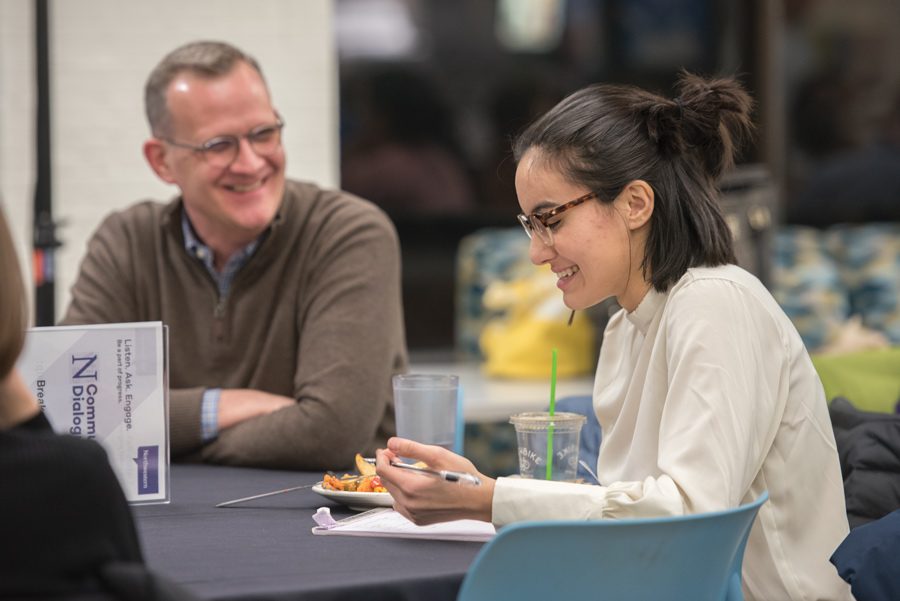Students, administrators talk mental health, financial aid at first community dialogue using new format
David Lee/Daily Senior Staffer
Katherine Conte, ASG’s vice president of analytics, talks at the Winter Quarter Community Dialogue on Wednesday. The dialogue was the first held in the new format recommended by ASG and Quest+ earlier this month.
February 28, 2019
Students and administrators discussed campus climate, mental health and financial aid at the Winter Quarter Community Dialogue on Wednesday. This was the first dialogue held in the new format Associated Student Government and Quest+ recommended to administrators.
Instead of having a microphone passed around to attendees, the new format featured students and administrators at tables organized by themed working groups, each with an ASG member taking notes and a staff member facilitating the discussion. Participants at the tables talked about student activities, health and wellness, academics, and campus life and climate.
Jabbar Bennett, the associate provost and chief diversity officer; Agneska Bloch, ASG vice president for academics; and Madisen Hursey, Quest+ co-president opened the dialogue and briefly addressed the changed format.
“If you hate it, we want to know,” Hursey said. “If you love it, we want to know.”
Bloch and Hursey wrote the recommendations in partnership with Bennett and Patricia Telles-Irvin, the vice president for student affairs, after Bloch and others were frustrated by the old format of Community Dialogue.
“I felt like the dialogue was not at all living up to the name ‘dialogue,’” Bloch told The Daily earlier this month. “I felt like it was really confrontational between administrators and students… it was just a really missed opportunity for us to collaborate and move forward together as students and administrators.”
Before starting the discussions, Hursey said “issues of financial resources or social justice” should come up at every table in the room, which is why there wasn’t a table specifically dedicated to financial aid or social justice issues on campus.
After an hour-long discussion, one student from each table shared the group’s main takeaways.
Students’ mental health was a hot-button topic — almost every table’s representative mentioned an aspect of mental health on campus. At one of the health and wellness tables, participants discussed how the culture of toxicity of perfectionism at Northwestern isn’t adequately addressed “from the top down.”
Students and administrators also discussed changes to course evaluations, graduation requirements, the applicability of skills learned in work-study jobs and different ways to alleviate pressures on low-income students, like having washers and dryers in Norris University Center.
Hursey said she was glad most students focused on the same issues.
“Even though it would have been nice to see more of a variety, it’s nice that there’s a unity in what students are feeling passionate about,” she said. “Hopefully that will send a message to administrators.”
Most of the issues students brought up have been on ASG’s agenda, Katherine Conte, ASG’s vice president of analytics, told The Daily. Conte said she was pleased the larger student body was thinking about the same things.
Overall, Hursey told The Daily, the dialogue went well, because more students had the opportunity to speak and the event was less “adversarial.” The new format allows for more of a real dialogue between students and administrators, she said.
Bennett, who said he has attended every dialogue since its founding during the 2015-2016 academic year, also enjoyed the new format. He said the table system allowed voices to “be heard at a particular table, but also across the entire room.”
Bloch said she was happy about the number of “action items” that came out of the conversation, both at her table and in the room at large. She also liked that the format allowed students to speak directly to administrators who care about the same things they do.
“I know there are certain people who will follow up with students, and that’s exactly what I was hoping for,” Bloch told The Daily. “They were able to have a direct interaction about it and I think that was super productive.”
On the administrative side, Bennett told The Daily that the challenge is “following up” and making sure the recommendations make it to the correct administrators so they can take action.
“We have to … make sure that we collect all these recommendations, and figure out what we can do to address the concerns we heard this evening,” he said.
Email: cameroncook2021@u.northwestern.edu
Twitter: @cam_e_cook
Related Stories:
— New community dialogue format aims to improve interaction after concerns
— Students share grievances about SAE return, housing rates at community dialogue



